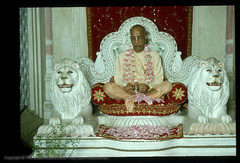In this age, the congregational chanting of the holy names of the Lord is the prescribed method for waking up. The ways and means are most scientifically presented by Lord Śrī Caitanya Mahāprabhu, and intelligent persons may take advantage of His teachings in order to bring about real peace and prosperity.
(Srimad Bhagavatam–1:1:4–purport).
The intelligent class of men, or brāhmaṇas, may give direction for such sacrifices in consultation with the previous ācāryas; the administrators may give all facilities to perform such sacrifices; the vaiśya class or mercantile community, who produce such goods, may offer them for sacrifice; and the śūdra class may offer their manual labor for the successful termination of such sacrifice. Thus by the cooperation of all classes of human beings, the sacrifice recommended in this age, namely the sacrifice of congregational chanting of the holy name of the Lord, may be executed for the common welfare of all the people of the world.
(Srimad Bhagavatam–2:1:37–purport).
Concerning Lord Caitanya, Śrīmad-Bhāgavatam (11.5.32) states:
kṛṣṇa-varṇaṁ tviṣākṛṣṇaṁ
sāṅgopāṅgāstra-pārṣadam
yajñaiḥ saṅkīrtana-prāyair
yajanti hi sumedhasaḥ
“In the age of Kali, intelligent persons perform congregational chanting to worship the incarnation of Godhead who constantly sings the name of Kṛṣṇa. Although His complexion is not blackish, He is Kṛṣṇa Himself. He is accompanied by His associates, servants, weapons and confidential companions.” After all, human life is meant for pleasing Nārāyaṇa, and this can easily be done by performing saṅkīrtana-yajña. Whenever there is congregational chanting of the holy names of the Lord, Gaura Nārāyaṇa, the Supreme Personality of Godhead in His incarnation as Lord Caitanya, immediately appears and is worshiped by saṅkīrtana-yajña.
(Srimad Bhagavatam–4:30:36–purport).
If one can cleanse his mind, he immediately comes to his original position of Kṛṣṇa consciousness, and thus his life becomes successful. Therefore all the great saints in the devotional line very strongly recommend the process of hearing. Śrī Caitanya Mahāprabhu introduced the congregational chanting of the Hare Kṛṣṇa mantra to give everyone a chance to hear Kṛṣṇa’s holy name, for simply by hearing Hare Kṛṣṇa, Hare Kṛṣṇa, Kṛṣṇa Kṛṣṇa, Hare Hare/ Hare Rāma, Hare Rāma, Rāma Rāma, Hare Hare, one becomes purified (ceto-darpaṇa-mārjanam [Cc. Antya 20.12]). Therefore our Kṛṣṇa consciousness movement is chiefly engaged in chanting the Hare Kṛṣṇa mantra all over the world.
(Srimad Bhagavatam–5:18:11–purport).
If one has the proper means and wealth, he should occasionally invite the devotees of Lord Caitanya who are engaged in preaching all over the world and hold a festival at home simply by distributing prasādam and talking about Kṛṣṇa during the day and holding congregational chanting for at least three hours in the evening. This procedure must be adopted in all centers of the Kṛṣṇa consciousness movement. Thus they will daily perform saṅkīrtana-yajña.
(Sri Caitanya caritamrta–2:3:203–purport).
When a person loudly chants the glories of the Lord’s activities, qualities, form, etc., his chanting is called saṅkīrtana. Saṅkīrtana also refers to the congregational chanting of the holy name of the Lord. In the Viṣṇu-dharma there is a statement glorifying this process of congregational chanting: “My dear King, this word Kṛṣṇa is so auspicious that anyone who chants this holy name immediately gets rid of the resultant actions of sinful activities from many, many births.” That is a fact. There is the following statement in Caitanya-caritāmṛta: “A person who chants the holy name of Kṛṣṇa once can counteract the resultant actions of more sinful activities than he is able to perform.” A sinful man can perform many, many sinful activities, but he is unable to perform so many that they cannot be wiped out by one single uttering of Kṛṣṇa.
(Nectar of Devotion).
In Bhakti-rasāmṛta-sindhu compiled by Śrī Rūpa Gosvāmī it is said that one should be very liberal in behavior and should avoid any undesirable activities. The most important affirmative points are that one should accept the shelter of a bona fide spiritual master, be initiated by him and serve him. In addition to these, there are thirty-five items of devotional service, and they can be analyzed as follows: (1) hearing, (2) chanting, (3) remembering, (4) worshiping, (5) praying, (6) serving, (7) engaging as a servitor, (8) being friendly, (9) offering everything, (10) dancing before the Deity, (11) singing, (12) informing, (13) offering obeisances, (14) standing up to show respect to the devotees, (15) following a devotee when he gets up to go to the door, (16) entering the temple of the Lord, (17) circumambulating the temple of the Lord, (18) reading prayers, (19) vibrating hymns, (20) performing saṅkīrtana, or congregational chanting, (21) smelling the incense and flowers offered to the Deity, (22) accepting prasāda (food offered to Kṛṣṇa), (23) attending the ārātrika ceremony, (24) seeing the Deity, (25) offering palatable foodstuffs to the Lord, (26) meditating, (27) offering water to the tulasī tree, (28) offering respect to the Vaiṣṇavas or advanced devotees, (29) living in Mathurā or Vṛndāvana, (30) understanding Śrīmad-Bhāgavatam, (31) trying one’s utmost to attain Kṛṣṇa, (32) expecting the mercy of Kṛṣṇa, (33) performing ceremonial functions with the devotees of Kṛṣṇa, (34) surrendering in all respects, (35) observing different ceremonial functions.
(Teachings of Lord Caitanya).







